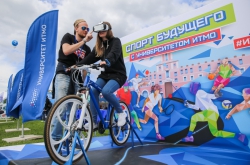The main objective for the foresight project is to familiarize the younger generation with the advanced scientific and technological achievements in the field of transport and look into the future of science and technology. Foresight sessions, competitions and workshops, as well as meetings with famous people give children and youth the chance to determine their future profession and to develop their interest in science and art. The Deputy Chairman of the city’s Education Committee, Andrei Borschevskiy, gave the opening words at the foresight festival “Go Starboard”:
"We, as adults, believe that the main achievement of this festival is giving the opportunity for you to choose your life path and profession, which you will dedicate the rest of your life to while working for the good of our wonderful city, and therefore, the good of the country. For this we use an interesting and modern format of foresight sessions, and are confident that soon this work will give real results,” - he said.

Over the course of the week, the participants of the festival will engage in an extensive tour of modern transport systems in St. Petersburg and Leningrad region. They will visit the new deep-water port “Bronka”; they will travel to the central section of the Western High-Speed Diameter; they will go to the Traffic Management Center; the Research Lab of Krylov State Research Center; visit the Russian shipping company Sovcomflot, as well as the system of structures protecting St. Petersburg from flooding.
One of the most important events of the program will be the foresight session "E-Transport: combining the three elements", dedicated to the development of sea and river transport and transport infrastructure. The participants, in a very short time, will come up with their own projects for water infrastructure of a future metropolis, visualize how it will look, and what resources can make their projects realistic.
"Foresight is a look into the future. Our task is to learn to see what will come in the future and learn how to create it. Our objective is to start with a dream that will become your guiding light", - shared Marina Lebedeva, Deputy Dean of FTMI at ITMO University.

This year the theme of the festival was "Maritime Petersburg". In the course of the program, the students will be able to discuss how to change the management of sea and river transport, its role in the future, and what it would look like in a few decades, when these youths will become adults and have their own careers.
The participants completed a virtual tour, starting from the spit of Vasilyevsky island – the main historic Russian port on the Baltic sea, all the way to the new passenger seaport that receives ships from Western Europe on a daily basis.
In the second part of the festival’s opening, there was a panel discussion on the prospects of development of transport and transport infrastructure. A fascinating dialogue between the participants of the festival, scientists and representatives of the business environment made it possible to briefly look into the future of St. Petersburg. Leading the discussion was Marina Lebedeva, the Deputy Dean of the Faculty of Technological Management and Innovation at ITMO University, and invited speakers such as Boris Sazhin, the Director of "Northern Capital Highway” (the company responsible for the construction of the WHSD Central section, which lasted four years, and Yuri Mogilyuk, Deputy Head of the Educational and Training Center for "Sovcomflot’s" Atlantic division. Sovcomflot is Russia’s largest shipping company, and one of the global leaders in the maritime transportation of hydrocarbons, as well as the servicing and support of offshore exploration and oil & gas production. According to Yuri Mogilyuk, 147 of the company’s newest vessels are currently working all around the world.

Boris Sazhin
To master the North
During the panel discussion, the participants and speakers discussed issues relating to the Northern part of the country which isn’t covered by transport options. Today, sea craft is the main form of transport for the shipping of petroleum products and downstream hydrocarbons (refined petroleum products), as well as bulk cargo and so on. It’s the task of the younger generation to consider which transport tools and solutions will help stimulate economic growth in the country.
Festival participants living in the Arctic Circle spoke out in support of the intensive development of the Northern territories, because, in the opinion of some experts, the North is our future. All resources, according to young experimenters, should be focused on conducting a study of the Arctic shelf, which is at present insufficiently investigated.
Prediction for the Development of Maritime and Road Transport in 2050
According to Yuri Mogilyuk, right now, the freight turnover on the Northern sea route for the "Sovcomflot" is about 4 million tons; by 2025, this figure will reach about 37 million tons, and, by 2030, 40 million tons. This is the worst-case forecast, and obviously, these figures will be even higher in reality. If today approximately 25 vessels travel through the Arctic, then in the future there will be approximately 20 times more of them. It will be a full-fledged shipping channel, says the expert.

Yuri Mogilyuk
For Boris Sazhin, it is obvious that in the next 10-15 years we will have a completely autonomous transportation system. All vehicles will synchronize their movements and the load on the transport network and traffic flow management will move to a much higher intellectual level.
“Perhaps we will have teleportation, too, but I hope, for technical purposes only, because in general life, I wouldn’t want to teleport, I want to drive on our wonderful roads and walk on our beautiful bridges,” said Yuri Mogilyuk.
Both speakers agreed on the opinion that the future world needs courageous, rational and intelligent professionals, and in particular, the ability to analyze.
"Basically what we want to see in the future generation is the ability to think critically and to see the essence of things and processes, to be able to influence them, to look freely and be able to make a decision. Technical skills are important, but the most important is how much a person wants to change the world," explained Boris Sazhin.





